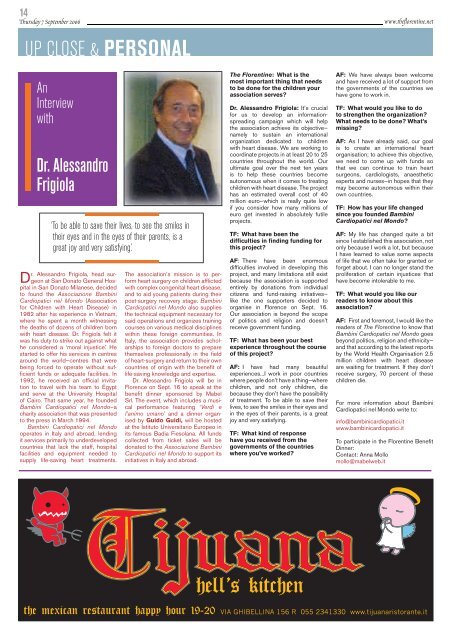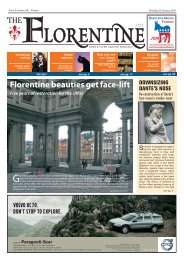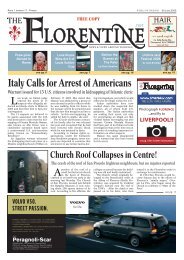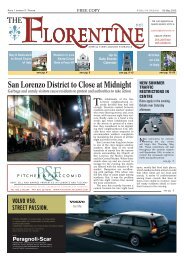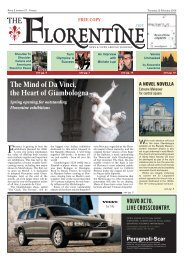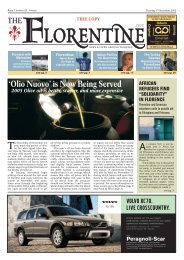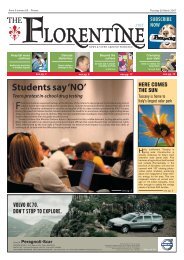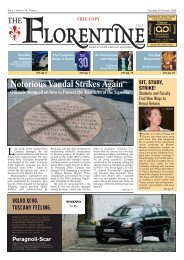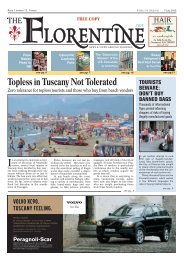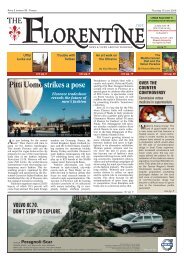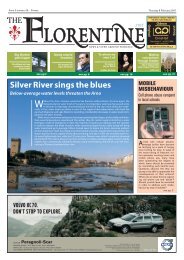Italy's favourite son, finally moving out - The Florentine
Italy's favourite son, finally moving out - The Florentine
Italy's favourite son, finally moving out - The Florentine
Create successful ePaper yourself
Turn your PDF publications into a flip-book with our unique Google optimized e-Paper software.
14<br />
Thursday 7 September 2006<br />
UP CLOSE & PERSONAL<br />
An<br />
Interview<br />
with<br />
Dr. Alessandro<br />
Frigiola<br />
‘To be able to save their lives, to see the smiles in<br />
their eyes and in the eyes of their parents, is a<br />
great joy and very satisfying.’<br />
Dr. Alessandro Frigiola, head surgeon<br />
at San Donato General Hospital<br />
in San Donato Milanese, decided<br />
to found the Associazione Bambini<br />
Cardiopatici nel Mondo (Association<br />
for Children with Heart Disease) in<br />
1982 after his experience in Vietnam,<br />
where he spent a month witnessing<br />
the deaths of dozens of children born<br />
with heart disease. Dr. Frigiola felt it<br />
was his duty to strike <strong>out</strong> against what<br />
he considered a ‘moral injustice.’ He<br />
started to offer his services in centres<br />
around the world—centres that were<br />
being forced to operate with<strong>out</strong> suffi<br />
cient funds or adequate facilities. In<br />
1992, he received an offi cial invitation<br />
to travel with his team to Egypt<br />
and serve at the University Hospital<br />
of Cairo. That same year, he founded<br />
Bambini Cardiopatici nel Mondo—a<br />
charity association that was presented<br />
to the press in March 1994.<br />
Bambini Cardiopatici nel Mondo<br />
operates in Italy and abroad, lending<br />
it services primarily to underdeveloped<br />
countries that lack the staff, hospital<br />
facilities and equipment needed to<br />
supply life-saving heart treatments.<br />
<strong>The</strong> association’s mission is to perform<br />
heart surgery on children affl icted<br />
with complex congenital heart disease,<br />
and to aid young patients during their<br />
post-surgery recovery stage. Bambini<br />
Cardiopatici nel Mondo also supplies<br />
the technical equipment necessary for<br />
said operations and organizes training<br />
courses on various medical disciplines<br />
within these foreign communities. In<br />
Italy, the association provides scholarships<br />
to foreign doctors to prepare<br />
themselves professionally in the fi eld<br />
of heart-surgery and return to their own<br />
countries of origin with the benefi t of<br />
life-saving knowledge and expertise.<br />
Dr. Alessandro Frigiola will be in<br />
Florence on Sept. 16 to speak at the<br />
benefi t dinner sponsored by Mabel<br />
Srl. <strong>The</strong> event, which includes a musical<br />
performance featuring ‘Verdi e<br />
l’animo umano’ and a dinner organised<br />
by Guido Guidi, will be hosted<br />
at the Istituto Universitario Europeo in<br />
its famous Badia Fiesolana. All funds<br />
collected from ticket sales will be<br />
donated to the Associazione Bambini<br />
Cardiopatici nel Mondo to support its<br />
initiatives in Italy and abroad.<br />
<strong>The</strong> <strong>Florentine</strong>: What is the<br />
most important thing that needs<br />
to be done for the children your<br />
association serves?<br />
Dr. Alessandro Frigiola: It’s crucial<br />
for us to develop an informationspreading<br />
campaign which will help<br />
the association achieve its objective—<br />
namely to sustain an international<br />
organization dedicated to children<br />
with heart disease. We are working to<br />
coordinate projects in at least 20 to 25<br />
countries through<strong>out</strong> the world. Our<br />
ultimate goal over the next ten years<br />
is to help these countries become<br />
autonomous when it comes to treating<br />
children with heart disease. <strong>The</strong> project<br />
has an estimated overall cost of 40<br />
million euro—which is really quite low<br />
if you consider how many millions of<br />
euro get invested in absolutely futile<br />
projects.<br />
TF: What have been the<br />
difficulties in finding funding for<br />
this project?<br />
AF: <strong>The</strong>re have been enormous<br />
diffi culties involved in developing this<br />
project, and many limitations still exist<br />
because the association is supported<br />
entirely by donations from individual<br />
citizens and fund-raising initiatives—<br />
like the one supporters decided to<br />
organise in Florence on Sept. 16.<br />
Our association is beyond the scope<br />
of politics and religion and doesn’t<br />
receive government funding.<br />
TF: What has been your best<br />
experience through<strong>out</strong> the course<br />
of this project?<br />
AF: I have had many beautiful<br />
experiences...I work in poor countries<br />
where people don’t have a thing—where<br />
children, and not only children, die<br />
because they don’t have the possibility<br />
of treatment. To be able to save their<br />
lives, to see the smiles in their eyes and<br />
in the eyes of their parents, is a great<br />
joy and very satisfying.<br />
TF: What kind of response<br />
have you received from the<br />
governments of the countries<br />
where you’ve worked?<br />
www.theflorentine.net<br />
AF: We have always been welcome<br />
and have received a lot of support from<br />
the governments of the countries we<br />
have gone to work in.<br />
TF: What would you like to do<br />
to strengthen the organization?<br />
What needs to be done? What’s<br />
missing?<br />
AF: As I have already said, our goal<br />
is to create an international heart<br />
organisation; to achieve this objective,<br />
we need to come up with funds so<br />
that we can continue to train heart<br />
surgeons, cardiologists, anaesthetic<br />
experts and nurses—in hopes that they<br />
may become autonomous within their<br />
own countries.<br />
TF: How has your life changed<br />
since you founded Bambini<br />
Cardiopatici nel Mondo?<br />
AF: My life has changed quite a bit<br />
since I established this association, not<br />
only because I work a lot, but because<br />
I have learned to value some aspects<br />
of life that we often take for granted or<br />
forget ab<strong>out</strong>. I can no longer stand the<br />
proliferation of certain injustices that<br />
have become intolerable to me.<br />
TF: What would you like our<br />
readers to know ab<strong>out</strong> this<br />
association?<br />
AF: First and foremost, I would like the<br />
readers of <strong>The</strong> <strong>Florentine</strong> to know that<br />
Bambini Cardiopatici nel Mondo goes<br />
beyond politics, religion and ethnicity—<br />
and that according to the latest reports<br />
by the World Health Organisation 2.5<br />
million children with heart disease<br />
are waiting for treatment. If they don’t<br />
receive surgery, 70 percent of these<br />
children die.<br />
For more information ab<strong>out</strong> Bambini<br />
Cardiopatici nel Mondo write to:<br />
info@bambinicardiopatici.it<br />
www.bambinicardiopatici.it<br />
To participate in the <strong>Florentine</strong> Benefi t<br />
Dinner:<br />
Contact: Anna Mollo<br />
mollo@mabelweb.it


